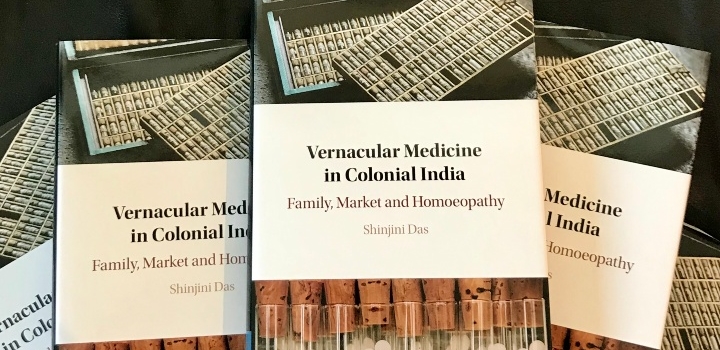Indian researcher and historian wins 2020 John Pickstone Prize
By: News Archive

Dr Shinjini Das, Lecturer in Modern Extra-European History, School of History, University of East Anglia has been awarded the 2020 John Pickstone Prize for her book Vernacular Medicine in Colonial India: Family, Market and Homoeopathy by the British Society for History of Science.
Vernacular Medicine in Colonial India: Family, Market and Homoeopathy explores how colonized populaces negotiated with and reshaped western medicine. It examines the interactions between the British state, Indian nationalist cultures and indigenous commercial interests relating to public health governance in India. Combining insights from the history of colonial medicine and the cultural histories of the family in British India, the book examines the processes through which Western homoeopathy was translated and indigenised in the colony as a symbol of Indian nationalism, a specific Hindu religious worldview, an economic vision and a disciplining regimen of everyday life.
The BSHS Pickstone Prize is awarded every two years and reflects the Society's mission to promote excellence in the history of science, technology and medicine. The prize was established to honour the late historian of science Professor John Pickstone (1944-2014).
Selecting the book for this prize, the judging panel has commented, ‘This outstanding book uncovers the archives that tell the story about how homoeopathy was brought to Bengal in the British colonial period. It is a highly sophisticated work and its development of the concept of the vernacular potentially transforms old debates about lay and professional discourses of science. It blends questions of nationalism, regionalism, modernity and tradition with great aplomb, and develops the nexus of family and state as a site for science. Das’s research exemplifies how much the discipline has to gain from research on the global south as a means to understand the nature of our own knowledge as well as that of science.’
Shinjini Das is a historian of British Imperialism and Modern South Asia, with wide-ranging research and teaching interests in histories of South Asia, colonial science and medicine, and (more recently) colonial Christianity. Her current research provisionally titled Healing Heathen Lands: Christianity, Medicine, Empire critically analyses the role of British Protestant missions and transnational humanitarianism in the making of colonial public health in India.
Related Articles

Innovation and Impact Awards now open for entries and nominations
The Innovation and Impact Awards are back for 2025 and looking to recognise and reward UEA’s most game changing staff, students, and graduates, and their collaborative work with partners outside the University.
Read more
Tragedy and chaos aboard the warship Gloucester
The Gloucesters troubled early history, intertwining maritime heritage with national and global narratives, has been revealed by research from the University of East Anglia.
Read more
British Academy Global professor boosts UEA history research
An Anglo-German collaboration researching the history of the only Englishman to have been elected King of Germany has been boosted by further funding and a British Academy Global professorship.
Read more